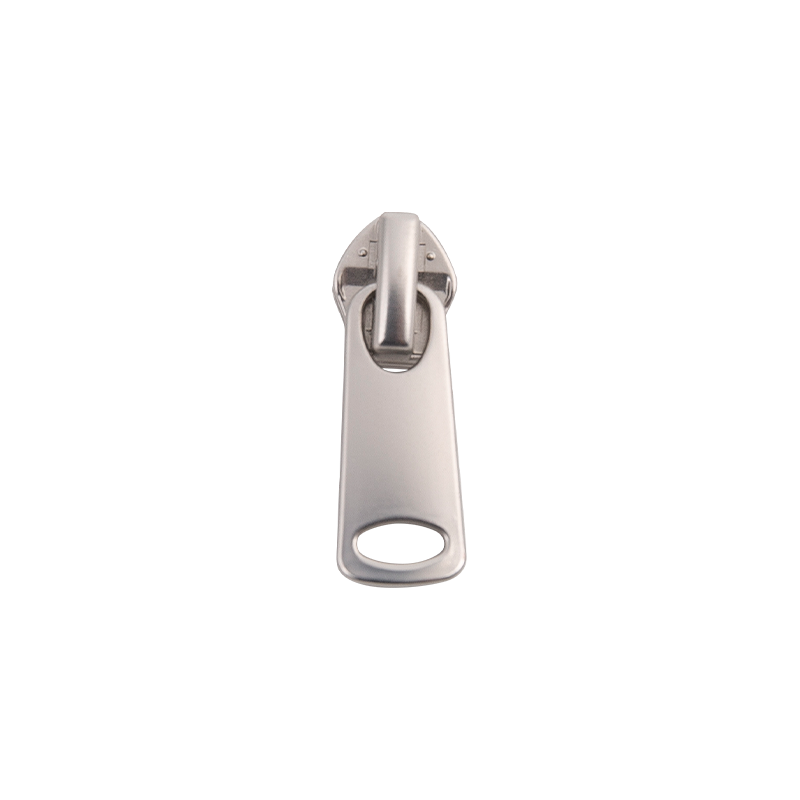Optimizing the strength of nylon zipper sliders to ensure that they are not easily damaged when facing various loads can be done in the following ways:
Choose high-strength nylon materials
The strength of nylon sliders depends first on their raw materials. Using high-strength nylon (such as nylon 66, nylon 6 or modified nylon materials) can significantly improve the tensile strength and durability of sliders. These nylon materials have a tighter molecular structure, better mechanical properties and wear resistance, and are suitable for working environments that withstand repeated pulling and closing for a long time.
Optimize the formula of nylon materials
By modifying nylon materials, the strength and wear resistance of sliders can be increased. For example, glass fiber, carbon fiber or other reinforcing materials can be added to further improve their strength and rigidity. Glass fiber reinforced nylon (such as GF30 nylon) has high tensile strength, rigidity and wear resistance, which can effectively improve the load-bearing capacity of sliders.
Improve the design structure of sliders
The design structure of sliders has a great influence on their strength. Optimize the shape and size of sliders so that they can distribute the applied force more evenly and avoid stress concentration. For example, reducing the sharp angle of the slider corners and increasing the arc transition can reduce local stress and prevent fracture caused by stress concentration. In addition, reasonable internal and external structural design, such as the use of reinforcing ribs or thickened parts, can also effectively improve the slider's ability to resist deformation and fracture.
Optimize the injection molding process
During the production process, control the injection molding temperature, pressure and cooling rate to ensure that the slider will not have internal bubbles or defects during molding. Uniform temperature control and appropriate cooling time can avoid insufficient strength caused by uneven material stress. In addition, the use of appropriate mold design can also ensure the accuracy of the slider during molding, thereby improving its overall strength.
Surface treatment and coating

By surface treatment of the slider, its wear resistance and pressure resistance can be enhanced. Common treatment methods include spraying, coating or surface hardening. These treatments can form a protective layer on the surface of the slider, reduce friction and wear, thereby extending the service life of the slider and avoiding strength loss caused by wear.
Increase the thickness of the slider
The thickness of the slider can be appropriately increased in the design, especially in the part that bears greater tension. This can improve the rigidity and strength of the slider and avoid cracks or deformation during long-term use. However, it should be noted that increasing the thickness may affect the weight and appearance of the slider, and a suitable balance should be found during design.
Introducing heat treatment technology
For some types of nylon sliders, heat treatment can be used to improve their molecular structure and thus increase their strength. Heat treatment can make the crystal structure of nylon materials more compact and improve their compressive and tensile strength. This is especially important for sliders that need to withstand large loads.
Strengthening quality control
During the production process, strict quality control is the basis for ensuring the strength of the slider. By conducting comprehensive inspections on each batch of products, including tensile strength tests, friction tests, high temperature and low temperature resistance tests, etc., it can be ensured that the quality of the slider meets the design standards. In addition, the maintenance and updating of production equipment and processes are also important factors in ensuring product quality.
Perform fatigue testing
In order to ensure that the slider can withstand long-term use and pulling and closing, it is essential to perform fatigue testing. By simulating the frequent opening and closing of the zipper in actual use, the performance and durability of the slider under high-frequency operation are tested. This helps to discover potential design or material problems and optimize them in a timely manner.
Consider special application requirements
For some special application scenarios, such as outdoor equipment, sports shoes, mountaineering backpacks and other places with high strength requirements, higher strength nylon sliders can be customized according to the use requirements. These customized sliders may require the use of different nylon materials, the addition of reinforcement components, and even the adjustment of the surface treatment and design of the slider according to the working environment.
Through the comprehensive application of the above methods, the strength of the nylon zipper slider can be greatly improved, ensuring that it is not easily damaged in a high-load environment, extending the service life and improving the overall product quality.

 en
en  русский
русский 한국어
한국어 get a free quote
get a free quote
















